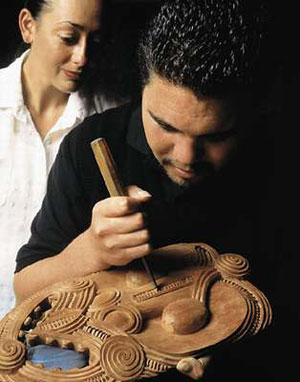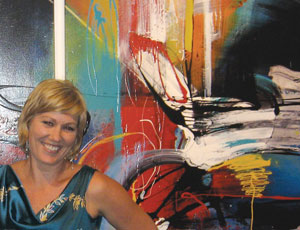Artist/Craftsperson
Tasks & duties

Artists/craftspeople may do some or all of the following:
-
discuss the client's requirements if they are working on a commission piece, and work out the cost
-
conceptualise, then decide on the object, landscape, theme or idea to be used for the artwork
-
design the artwork or do preliminary sketches
-
research traditional designs for artwork
-
choose methods, such as painting, drawing, pottery or sculpting, to create the artwork
-
choose materials such as glass, clay, wood, metal, stone, fabric and paints
-
prepare materials to be used
-
prepare and mix pottery glazes (chemicals that give a shiny finish) for decorating pottery, and prepare, load and fire kilns
-
carve wood, stone, bone, shell or metal
-
produce drawings or cartoons for publications
-
make specialised tools if required
-
display artwork for sale and show
-
teach and do public demonstrations
-
apply for grants and funding
Artists/craftspeople who also market, promote and sell their work may do some or all of the following:
-
run their own galleries or small art businesses to sell their work, or other artists' work
-
negotiate and arrange exhibition space in shows
-
arrange advertising for shows
-
compile an artist biography, including a summary of their own personal history and concepts
-
compile a written and/or photographic record of every artistic work they have completed and where they can be found (for use as a record and in portfolio)
-
present potential show ideas and concepts to gallery directors
-
attend exhibitions of other artists for networking purposes
Specialisations
Artists/craftspeople can specialise in a number of areas, including:
-
making pottery or ceramics
-
fine arts (painting)
-
mural drawing
-
carving
-
craftmaking
-
sculpting
Skills & knowledge

Artists/craftspeople need to have:
-
artistic and design skills
-
drawing skills
-
knowledge of the materials available and different techniques that are suitable for the medium being worked with
-
knowledge of art history
-
skill using and caring for tools and equipment such as brushes, chisels or engraving tools
-
knowledge of the history of different cultures if doing traditional designs
-
good understanding of their target market, so they know what ideas will sell
-
research skills
-
communication skills, including the ability to get clients to verbalise their ideas
-
the ability to interpret ideas
-
good planning and time management skills
-
business management skills
-
a working knowledge of photography
Entry requirements
To become an artist/craftsperson you need to have a good level of artistic ability. A well-presented portfolio that presents a range of your work is also useful for showing prospective gallery owners and art industry people what you can do.
Secondary education
There are no specific secondary education requirements, but useful subjects include art, art history, technical drawing, computer graphics, English and maths. A tertiary entrance qualification is required for those intending to complete an arts degree or diploma.
Tertiary education
Although many artists are self-taught, a tertiary qualification is recommended to develop and broaden artistic ability. A degree in fine arts or graphic design may be useful.
Training on the job
Skills are gained on the job. Artists/craftspeople may work alongside a mentor to develop their skills. They may also attend night classes, correspondence courses or have private tuition to keep learning or developing techniques, and to keep motivated.
Useful experience
Useful experience for artists/craftspeople includes:
-
design work or art courses
-
work using a range of art mediums
-
work as an art gallery assistant
-
backstage theatre work
-
work on community projects such as mural painting
-
work in an art supply shop
Related courses
Crafts
Fine Arts
Graphic Arts and Design Studies
Jewellery Making
Mana Whakairo (Maori Carving)
Nga Mahi a te Whare Pora (Maori Weaving)
Textile Making
For more information, please refer to Career Services.
Document Actions
